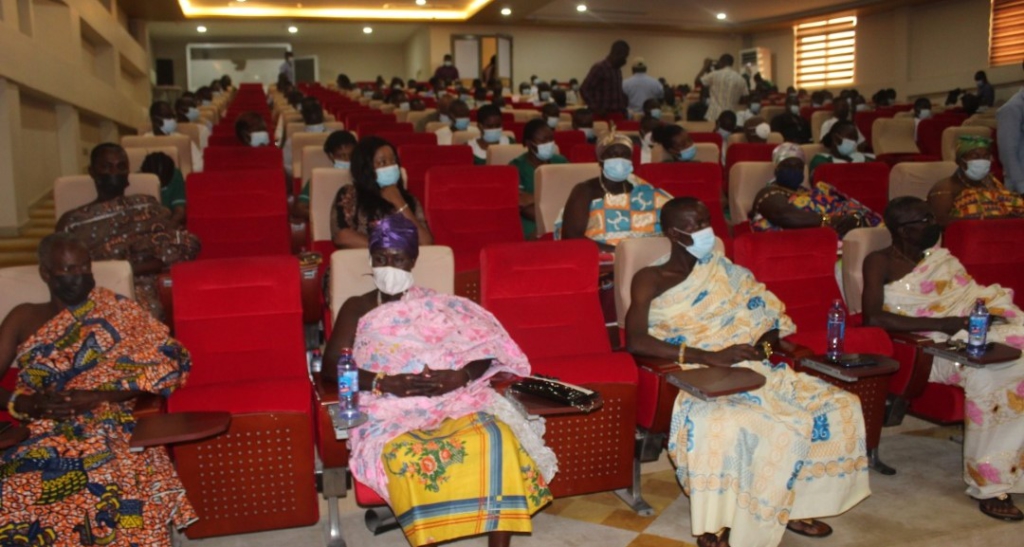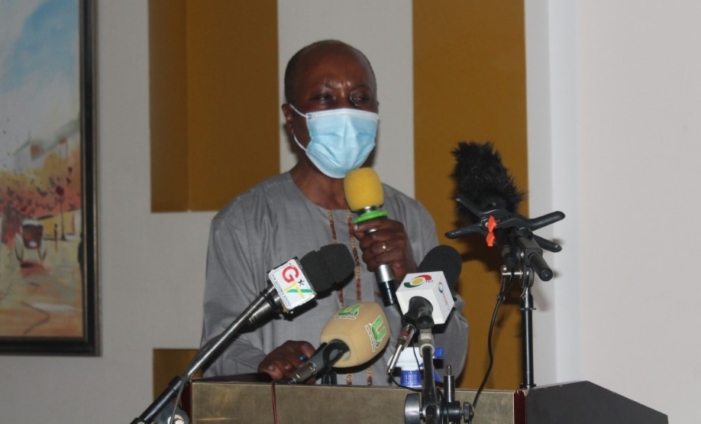The Ghana Health Service (GHS) has launched the 2021 National Mass Drug Administration (MDA) in Sunyani to fight the Neglected Tropical Diseases (NTDs), especially human Onchocerciasis.
The MDAs, scheduled from August 9 to 22, beyond the 11 endemic districts, have targeted 137 districts in all regions of Ghana except Greater Accra.
About 12.6 million people are expected to take the drugs in this year’s implementation of the NTD program.
Dr Kofi Asemanyi-Mensah, the NTD Program Manager, who launched the MDA on the theme "Face NTDs, End the Neglect through Effective and Quality MDAs", said the program's implementation forms part of eliminating Onchocerciasis or river blindness by the year 2025.
Ghana remains endemic to the human onchocerciasis, a disease of the skin and eye caused by Onchocerca volvulus, a parasitic worm transmitted by Simulium species (blackflies) that breed in fast-flowing rivers and streams.
Some of the infected river basins are found in the Pra, Pru, Offin, Afram, Bia, and Bui-Black Volta rivers.
The disease, one of the 14 NTDs in Ghana, is also endemic in 30 countries in sub-Saharan Africa, three countries in Latin America, and Yemen.
But the World Health Organization has verified the three countries in Latin America as free of human onchocerciasis since 2013.

Dr Kofi Asemanyi-Mensah explained that over one billion people globally suffer from one or more NTDs that cause disability, severe disfigurement, and blindness.
“These diseases affect the world's most vulnerable population with devastating and lifelong disabilities that contribute to trapping individuals, families, and even entire communities in poverty”, he said.
He added, the Ghana Health Services resolve to embark on its prevention and control, which is central to ending extreme poverty in the next two decades.
The NTD Program Manager said the approach in combating the Onchocerciasis/river blindness would be by using drugs that have been proven safe and effective, which can be delivered by trained non-health personnel to affected communities.
“This approach known as Mass Drug Administration provides a single dose medication to all eligible individuals once or twice a year”, he explained, adding, “implemented over three to seven years, the MDA can significantly control the burden of NTDs, and in some cases, elimination can be achieved”.
While expressing the Health Service appreciation to all health workers, community drug distributors, and other volunteers for their continuous dedication to the elimination of the NTDs, the Program Manager, Dr Kofi Asemanyi-Mensah, also urged stakeholders to encourage all eligible persons on the need for the drugs in the fight against Onchocerciasis and other NTDs.
He believes it will ensure the plague is purged from the affected communities to enable them to go about their normal activities.
In a speech read on her behalf, the Bono Regional Minister, Justine Owusu Banahene, said the geographical conditions and features of the hitherto Brong Ahafo Region have been conducive for the transmission of some of the NTDs including Elephantiasis, Bilharzia, and Buruli ulcer.
She noted that successive governments are fully aware that a healthy workforce is a productive labour in nation-building, hence prioritising health and huge allocation of resources to support the delivery of quality health care.
Owusu Banahene appealed to the media to offer their platforms for messages of the benefits of the Onchocerciasis MDA to be communicated to the citizenry.
She, however, assured that the government remains resolute in its commitment to ensuring the total eradication of the Onchocerciasis and other NTDs.
The participants at the national launch included public health directors across the country, governmental agencies including Ghana Education Service and the Information Services Department, Religious Leaders, Health Service Providers, and Partners in Health.
Latest Stories
-
Black Stars could miss key players for 2025 Unity Cup – Dr Randy Abbey
2 hours -
Pyramids grab late equaliser in African Champions League final
4 hours -
EU calls for ‘respect’ after Trump threatens 50% tariffs
4 hours -
Ronaldo ‘could play’ in Club World Cup – Infantino
4 hours -
Amorim tells Garnacho he can leave Man Utd
4 hours -
Djokovic makes more history with 100th singles title
4 hours -
Ten Hag set to replace Alonso as Leverkusen manager
4 hours -
Salis’ Sunderland secure Premier League return
4 hours -
Assin Fosu chiefs and elders bless TGMA Unsung Artiste of The Year, Yaw Darling
5 hours -
Middle-aged, 2 children trapped in their home after a fig tree sealed their frontage doors
5 hours -
Roots of resistance: The climate cost of cutting Accra’s trees
5 hours -
Reimagining Informality: Harnessing the Urban potential of street vending in Ghana
6 hours -
Former Yendi MP Dr Farouk Mahama donates towards funeral of late Mion chief
6 hours -
Ghana Gas board pledges accountability and staff support during operational tour
6 hours -
Burkina Faso’s uprising is a rebirth, not rebellion – Ras Mubarak
6 hours

